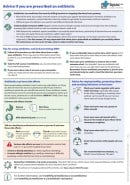You can now add Healthify as a preferred source on Google. Click here to see us when you search Google.
Ciprofloxacin
Sounds like 'sip-roh-flox-ah-sin'
Key points about ciprofloxacin
- Ciprofloxacin is an antibiotic used to treat infections that haven't improved with other antibiotics, or when other antibiotics can't be given.
- Ciprofloxacin is also called Cipflox®.
- Find out how to take it safely and possible side effects.

Ciprofloxacin is an antibiotic used to treat infections caused by bacteria. It works by killing or stopping the growth of bacteria (bugs) and getting rid of the infection. Ciprofloxacin is usually used by specialists for infections that haven't improved when you've been treated with other antibiotics, or when other antibiotics can't be used. Like all antibiotics, it's not effective against infections caused by viruses.
Note: A single dose of ciprofloxacin is given to stop the spread of meningococcal disease amongst close contacts. Read more about ciprofloxacin for meningococcal prophylaxis.
In Aotearoa New Zealand ciprofloxacin is available as tablets in different strengths (250 mg, 500 mg and 750 mg) and can be given as an injection in the hospital.
- Always take your ciprofloxacin exactly as your doctor has told you. The pharmacy label on your medicine will tell you how much to take, how often to take it and any special instructions.
- The dose will be different for different people depending on what it's used for.
- Your doctor will tell you how long to take ciprofloxacin for, depending on the type of infection.
- With most infections you should start to feel better within a few days.
- Timing of your doses: You can take ciprofloxacin tablets with or without food, at about the same time each day. Swallow the tablets with a drink of water, don't take with milk. Don't chew them.
- Don't drink milk or take indigestion remedies or medicines with iron or zinc (such as multivitamin tablets) 2 hours before or after you have taken ciprofloxacin: These interfere with the way ciprofloxacin is absorbed and can stop it from working properly.
- Missed dose: If you forget to take your dose, take it as soon as you remember. But if it's nearly time for your next dose, take the next dose at the right time. Don't take extra doses to make up for a forgotten dose. If you're not sure what to do, ask your healthcare provider.
- Finish the course: Take the whole course of antibiotics for the number of days you've been told to. Don't stop taking it early, even if you feel your infection has cleared up. If you stop your treatment early, your infection could come back.
- Sun sensitivity: Ciprofloxacin can make your skin more sensitive to sunlight, so it's important to cover up and wear sunscreen if you spend time outside, even on a cloudy day.
- Alcohol: Limit alcohol while you're taking ciprofloxacin. Alcohol can increase your chance of side effects, eg, dizziness or feeling faint.
- Other medicines: Ciprofloxacin can interact with some medicines, herbal supplements and rongoā Māori, so check with your doctor or pharmacist before starting ciprofloxacin and before starting any new products.
- Dizziness: Ciprofloxacin can cause dizziness, so be careful driving or operating machinery until you know how this medicine affects you.
- Pregnancy or breastfeeding: If you're pregnant or breastfeeding, or planning a pregnancy, let your doctor know before starting ciprofloxacin.
Like all medicines, ciprofloxacin can cause side effects, although not everyone gets them. If you're concerned about any symptoms you think might be related to your medicine, talk to your healthcare provider. The following information offers some guidance but doesn't include all possible side effects.
Tendon problems
Ciprofloxacin can cause tendon problems, eg, tendinitis or tendon rupture. The Achilles tendon in your ankle or calf is most likely to be affected but other tendons can also be involved.
You're at higher risk if you:
- are over 60 years of age
- are taking steroids (eg, prednisone)
- have chronic kidney disease or have had a kidney, heart or lung transplant.
Let your healthcare provider know straight away if you get pain and swelling in your joints. This can happen from a few hours after the first dose to several months after you've stopped the treatment. Read more about medicines and tendon problems.
Common side effects
Tell your healthcare provider if these side effects bother you.
- Nausea (feeling sick), stomach pains.
- Mild diarrhoea (runny poo): Drink plenty of fluids such as water to avoid dehydration.
- Headache.
- Tinnitus or ringing in the ears.
- Problems sleeping.
- Sore muscles: If you have sore muscles or joints, let your healthcare provider know.
- Feeling dizzy or sleepy: Be careful when driving or using tools until you know how this medicine affects you. Avoid alcohol.
- Confusion, anxiety or low mood: If you’re worried, feeling anxious or feeling low, talk to your healthcare provider.
Tell your healthcare provider immediately or phone Healthline free on 0800 611 116 if these occur
- Problems with your heart rate or breathing.
- Swelling of your ankles.
- Seizures.
- Signs of problems with your liver, eg, yellowing of your skin or eyes, dark urine, pain in your abdomen.
Phone 111 for an ambulance or go to your nearest accident and emergency (A&E) clinic if these occur
- Signs of an allergic reaction such as itchy skin, and rash, swollen lips or tongue, problems breathing, like a tight chest or shortness of breath.
Read more about medicines and side effects and reporting a reaction you think might be a side effect.
The following link provides further information on ciprofloxacin:
Ciprofloxacin(external link) New Zealand Formulary Patient Information
Brochures
Medicines and side effects(external link)(external link) Healthify He Puna Waiora, NZ, 2024
Advice if you are prescribed an antibiotic(external link)(external link) BPAC, NZ, 2024
5 questions to ask about your medications(external link) Health Quality and Safety Commission, NZ, 2019 English(external link), te reo Māori(external link)
References
- Ciprofloxacin(external link) New Zealand Formulary
- Systemic fluoroquinolone antibiotics: safety reminder(external link) Medsafe, NZ, 2025
Brochures

Medicines and side effects
Healthify He Puna Waiora, NZ, 2024

Health Quality and Safety Commission, NZ, 2019 English, te reo Māori
Credits: Sandra Ponen, Pharmacist, Healthify He Puna Waiora. Healthify is brought to you by Health Navigator Charitable Trust.
Reviewed by: Angela Lambie, Pharmacist, Auckland
Last reviewed:
Page last updated:






